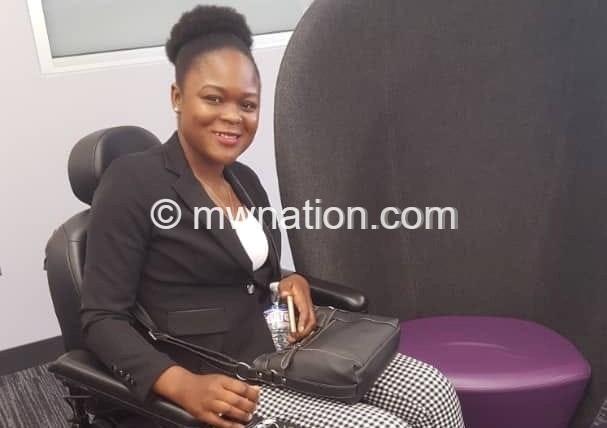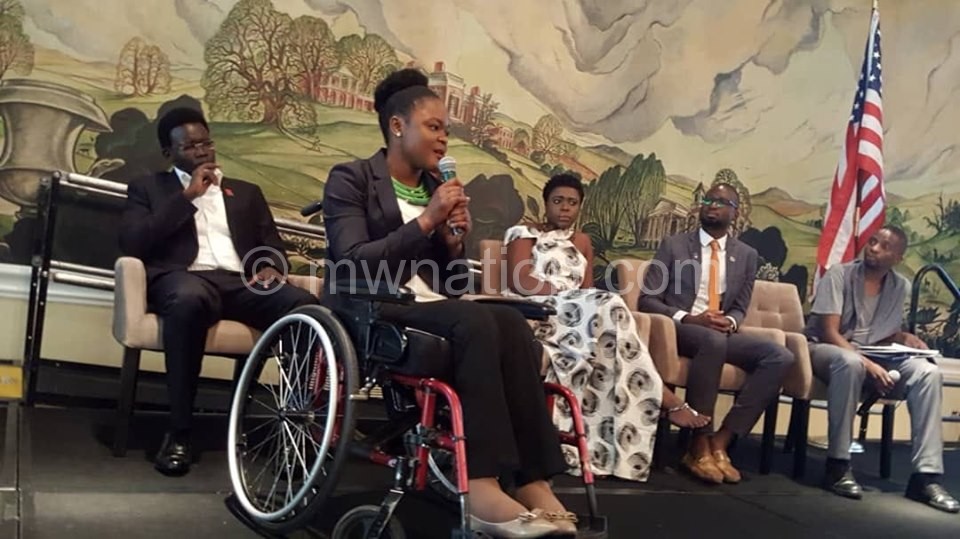Chrissy Zimba: Promoting employment rights for youth with disabilities
At the age of 11, Chrissy Duma-Duma Zimba, now aged 30, fell from a mango tree at her home village in Mzimba, breaking her spine; she was never to walk again.
That incident changed her life expectations. She had always wanted to be a nurse, but how could she become one in a wheelchair?

Growing up in her maternal grandparents’ household at Nyakasalu Village in Euthini, Mzimba, following the loss of her father, she recalls that every day, her grandfather would wake them up between three and four in the morning to help with some farm work before going to school.
One weekend after waking up around four in the morning as usual, they completed the farm work at around 10 am and they decided to go and pick some mangoes from trees around the farm with her siblings.
“As I was up in the tree, the branch that I stepped on broke and I fell on my back. I was carried by my cousins and uncles in a wheelbarrow to the hospital about two and a half hours away,” explains the young woman.

Chrissy stayed at the health centre for about three days before an ambulance took her to Mzimba District Hospital following her doctor’s reference.
“At the district hospital, I learned that the injury was a major one. An x-ray revealed that my spine was severely injured and that my chances of ever walking again were slim,” she explains.
She stayed at Mzimba District Hospital for three months from where she was referred to Mzuzu Central Hospital, a tertiary referral in the Northern Region.
It was there that she met an English physiotherapist Sheila Lawrence who reiterated that she would not be able to walk again.
“I cried when she told me. She asked me why I was crying and I told her I was a day scholar, and that not being able to walk again would mean the end of my education. On the other hand, I grew up seeing people with disabilities begging on the streets and I thought I would join them as a beggar,” she recalls.
Her love for school encouraged Lawrence to assist. She was going to do whatever she could to see Chrissy carry on with her studies. She got her an English book and gave her assignments every night and marked them the next day.
After getting discharged, Chrissy was home-schooled through her junior level education with the help of Lawrence. Her teachers came twice a week.
She passed her junior certificate examinations (JCE) with flying colours.
“I was the second-best student in the whole zone and my physiotherapist was pleased. With the help of Malawi against Physical Disabilities (MAP) in Rumphi, I then went to Our Future Private School where I pursued my senior secondary school studies.
In 2005, I attained my Malawi School Certificate of Education (MSCE),” she explains.
Life in school was not easy for her. She had trouble accessing the library and the science laboratory for instance.
“Sometimes my friends had to lift me on a wheelchair to access some classrooms. My classmates were very welcoming and were willing to help me when I need to access some facilities,” she says.
Nonetheless, her determination saw her selected to Mzuzu University (Mzuni) to pursue a Bachelor of Science in information and communication technology degree.
She became the first person in a wheelchair to study at Mzuni where management was very willing to make reasonable adjustments so that she could complete her studies.
“They even made some modifications in the hostel where I was staying so that I could easily get inside. Some ramps were also installed in some of the lecture rooms that my class was using,” says Zimba.
After her graduation in 2012, she worked in the monitoring and evaluation department at the Mzuni Centre of Excellence in Water and Sanitation for close to three years.
As luck would have it, she got a scholarship for a master’s degree in public policy and governance at Africa University in Zimbabwe and graduated in June 2017.
After a year’s work with Malawi Revenue Authority (MRA), she applied for the African Union (AU) youth volunteer corps in 2017 and works with the African Union Commission in Ethiopia since 2018.
Before joining the AU Commission, Chrissy shares that she applied for three other jobs from international organisations and was lucky enough to be invited for interviews.
“I did not indicate in my application that I was living with a disability. I went for the interviews at the first organisation to find that the interviews were taking place on the third floor. They had to ask watchmen to lift me there.
“In the second organisation, they interviewed me in the reception area. So when I was invited for interviews at the third organisation I did not even attempt to go because of the two bad experiences,” she explains.
She confesses that at times she feels it would have been easier to be picked for one of the jobs if the organisations were accessible to her.
She wondered how many other youth with employability skills cannot be employed because the workplaces are creating barriers to their participation.
And as she pursued her master’s degree, her thesis led her to a deeper research around the area and she found out that unemployment levels among Malawian youth with disabilities are very high.
She regrets that a lot of things outlined in the disability policy are taking longer to be implemented.
“For government to provide equal opportunities, it has to ensure that workplaces are accessible for people with disabilities. The Disability Act also outlines the same but most workplaces are still inaccessible,” she explains.
This prompted her to start advocating employment of young people with disabilities who have skills.
Her advocacy has led the human resource, science and technology department in the African Union (AU) youth division to make a special call for young people with disabilities to apply for volunteerism and gain international work experience with the AU.
She has a number of propositions up her sleeves that could help the youth that have disabilities to find employment.
Among other things, the young advocate proposes that government should fully operationalise the Disability Act, and also provide employment quotas for people with disabilities.
She also stresses that when coming up with strategies for reducing unemployment among the youth, government should also consider youth with disabilities.
Access to loans is another area which she believes would help people with disabilities who do not have employability skills to start businesses improve their livelihoods.
Additionally, she believes that an incentive policy for organisations that are employing people with disabilities would also go a long way in encouraging employers to hire people with disabilities.
Not only that, she points out that public transport needs to be accessible to people with disabilities because as things are now, the dignity of people with disabilities is often compromised when boarding public transport.
However, she is pleased that organisations are progressively making efforts to accommodate people with disabilities in Malawi.





